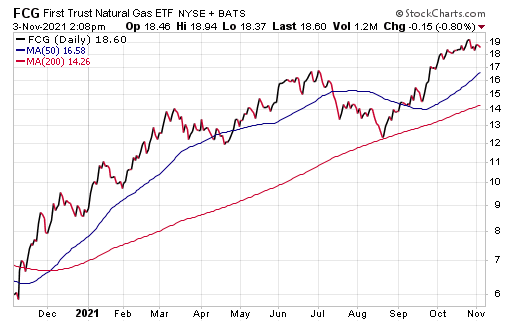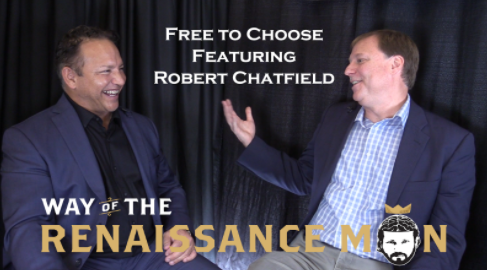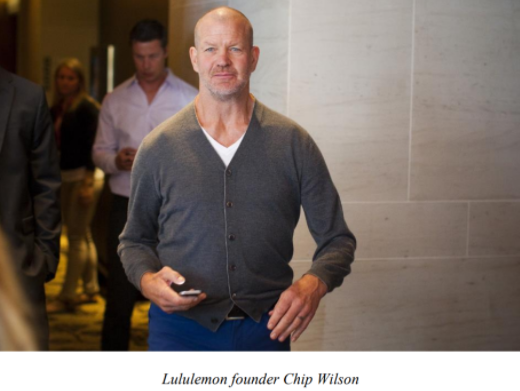Dumping The Ideological ‘Package Deal’
In September 2020, I presented you with a guest editorial by my very good friend, writer, filmmaker and intellectual activist Stewart Wade Margolis. Stewart has been my friend and fellow advocate for a reason since our days together at UCLA. He’s also been a guest on my podcast, Way of the Renaissance Man. In this short essay, Stewart warns against falling into the trap of demonizing your ideological enemies and failing to make the effort to see that there are values-based reasons why people support their side. You may think they are wrong — and they may well be wrong — but they are not evil. And to believe that they are is not just a mistake, but a prescription for societal destruction. I love this essay and, given that so much of our social and political polarization has only been exacerbated in the roughly 14 months since it first appeared in The Deep Woods, I thought now is an especially important time to reinforce this important message. As I’ve said many times in this publication, the only antidote to bad ideas are good ideas. Fortunately, this essay provides us with many good ideas.
Wrong Doesn’t Mean Evil
By Stewart Wade Margolis
A great deal has been written lately about the rise in partisanship and tribalism. But even so, all too often, I see people falling into the trap of demonizing their ideological enemies, assuming that anyone on the “other side” is not just mistaken, but corrupt, bad — even evil. They cannot understand how any good person could possibly support X, or believe Y. Some of this is just a failure of empathy or the desire to even try to understand where someone else is coming from. But a large part of the problem is that our ideological camps come as package deals. Of course, you can be someone who supports a woman’s right to choose, and also believes in free markets (I am such a person), but you won’t find a comfortable home in either of the prevailing ideological camps. Since virtually everyone demands that you choose sides, what is the average person to do?
For me — and for a lot of people I know — neither side is truly a good fit. But we’re told we have to pick a side. And once you pick, you’re expected to toe the party line. I think people might be less prone to demonizing the other side if they recognized that a lot depends on which part of the package deal you focus on.
Conservatives I know simply can’t imagine how anyone could align themselves with progressives. They focus on the leftists who are nihilists, communists — or just plain crazy — and they don’t see how any good person could end up in this camp. But most of the liberals I know dismiss those elements as fringe and focus on the issues that concern their daily life: the freedom to love whomever you choose, reproductive freedom, an end to the war on drugs and police reform. If these issues are important to you — as they are to me — it’s not that hard to see how one could end up on this side.
Similarly, liberals I know find it incomprehensible that any good person could support Trump or the conservatives. They focus on the apparent racism, misogyny, homophobia, as well as the lies and the anti-science attitude until becoming horrified. But most of the conservatives I know are intelligent and educated. They are not racist, homophobic, or misogynistic. They are focused on the fact that Trump seems to be pro-America, pro-business and anti all the worst elements of the crazy left. They don’t necessarily like or approve of the way Trump conducts himself, but they believe that the core values of the nation are under attack, and they like that Trump seems to “fight back.”
I am profoundly pro-America, not in a my-country-right-or-wrong way, but because in its founding, America was the first country to lay out a system that protects individual rights. It did so imperfectly, but it was still a profound leap forward for humanity. So, if I were to focus on this aspect alone, I, too, might end up supporting Trump. After decades of our intellectuals denigrating America, it’s not surprising that “Make America Great Again” would resonate with people.
My point is not to try to convince you to change sides. My goal is to make you see that there are values-based reasons (that you could relate to, if you made the effort) for people to support their side. You may think they are wrong — and they may well BE wrong — but they are not evil. And to believe that they are is not just a mistake, but a surefire way to keep America on the road to destruction.
This is well-trod historical territory. Do you like how this worked out for Weimar Germany? It is not too late to return to a world where we debate ideas, with the understanding that the other party is also trying to figure out the right path. I know that right now this seems like an impossible, utopian ideal. But I don’t think it is. The first step: dump the package deal. You don’t have to buy into it. Vote how you think is best, but don’t kid yourself that one side or the other is all good or all bad.
But is that really the case? It’s tempting to think the opposite when so many people espouse utter nonsense on social media. And it’s easy to think the “other side” is evil when they viciously attack you on the internet. But the internet is not real life, and when I think about the discussions that I’ve had in person with people I disagree with, I don’t think I’ve ever concluded that I was dealing with an evil person. I’ve talked with a lot of profoundly WRONG people, but if I took the time, I could almost always see where their beliefs came from. Often it was a place of fear, other times of wishful thinking or some other kind of mistaken premise. Almost never did their mistakes come from true evil, from a desire to destroy — at least not entirely. Nihilism does exist, but I think it usually co-exists with other, better, impulses.
The world today, with its 24-hour news cycle and social media, tends to amplify our awareness of all that is wrong in the world. It’s easy to become cynical. But if the majority (or even a substantial minority) of people are evil, not just mistaken but fundamentally bad, then humanity is doomed. If that were the case, though, I don’t see how we ever would have left the caves, much less created the modern world. The fact that progress happens, that we are orders of magnitude better off than people just a few generations ago, demonstrates that there IS a lot of good in the world.
Ayn Rand wrote about the “benevolent universe” premise. This is the idea that reality is a place where human flourishing is possible. As part of this premise, I think it makes sense to recognize that most humans are values-seekers. They want to do good, to be happy and successful. They might not have the right ideas on how to accomplish this (in fact, centuries of bad philosophy mean that most don’t), but their motivation is essentially positive. Demonizing those who disagree with you negates this premise. It also tends to make you angry and hostile, which is not a great way to win friends and influence people. You’re far more likely to change someone’s mind if you treat them with respect and recognize your shared goals and values.
Stewart Wade Margolis is a writer, filmmaker and intellectual activist who champions the virtue of rationality. You can find out more about him at https://stewartwadefilms.wordpress.com/.
***************************************************************
ETF Talk: Profit from Natural Gas with This Fund
The energy sector is one that has been in and out of favor in recent years. That means that investors who successfully time a return to the sector could be in for serious potential profits. The sector can be volatile at times, which can be a blessing, or a curse, and may reward disciplined investors.
For a slightly less traditional approach to energy, consider First Trust Natural Gas ETF (FCG). This exchange-traded fund (ETF) offers dedicated exposure to the natural gas subsector. Companies selected for inclusion need not necessarily do business only in natural gas, but all are connected to it in some way.
The fund also has a cap on its exposure to master limited partnerships (MLPs). FCG is weighted by market cap, so it provides access primarily to larger companies. That said, the energy sector isn’t all about the mega caps; a fairly large percentage of the fund is still accounted for by small- and mid-cap stocks. It invests almost exclusively in domestic equities.
FCG’s performance in the last year has been stellar. The fund’s price has nearly tripled in that time – up more than 180%. And that doesn’t include the bonus of its 1.61% yield, which is more than sufficient to cover a moderate expense ratio of 0.60%. Its assets total more than $510 million, and it is fairly liquid.

Chart courtesy of StockCharts.com
The top 10 holdings of FCG hold a high 42.64% of its assets. These include ConocoPhillips (COP), 4.54%; EOG Resources, Inc. (EOG), 4.47%; Pioneer Natural Resources Co. (PXD), 4.36%; Devon Energy Co. (DVN), 4.35%; and Diamondback Energy, Inc. (FANG), 4.27%. There are just 41 holdings in total, which make it more selective than broader energy ETFs. FCG’s strategy has produced superior returns in recent periods.
If you think now is the time to try investing in natural gas companies, First Trust Natural Gas ETF (FCG) may be a compelling way of doing so.
As always, I am happy to answer any of your questions about ETFs, so do not hesitate to send me an email. You just may see your question answered in a future ETF Talk.
***********************************************************
Milton Friedman, Happy Warrior
When I was a kid, I watched a documentary that influenced my young brain immensely, and it was called “Free To Choose.”
The original 1980, 10-part television series was by the great Nobel-Prize-winning economist Milton Friedman.
In academic circles, Friedman was chiefly associated with the renaissance of the role of money in inflation and the consequent renewed understanding of the instrument of monetary policy. For his studies in these subjects, he was awarded the Nobel Prize in 1976.
Yet it was the “Free To Choose” documentary, as well as his many subsequent public appearances via lectures and on TV, that helped bring into the mainstream the meaning of freedom, and why it is so vital to economic prosperity and social prosperity.
The “happy warrior” approach that Friedman took, as well as his passion for ideas, are kept alive by the Free To Choose Network, a global media nonprofit organization dedicated to promoting Friedman’s work, as well as other outstanding scholars such as Thomas Sowell.

Directing that effort is Free to Choose Network President and CEO Robert Chatfield.
At the recent FreedomFest Conference, Chatfield sat down with me for an episode of the Way of the Renaissance podcast to reminisce about Freidman, his wife and intellectual partner Rose, Friedman’s insatiable intellectual curiosity, the history of the “Free To Choose” documentary and how it came to fruition and even how Milton Friedman, at age 90, learned how to do stomach crunches!
I loved this interview with Robert Chatfield, and if you’ve ever wanted to learn more about the great Milton Friedman and the critical role he played in my life, and the life of society at large, then this episode of the Way of the Renaissance Man podcast is just for you.
*****************************************************************
In case you missed it…
Under A Benevolent Mushroom Cloud
Growing up as a child during the Cold War, I had a persistent, if not immediate, sense of fear omnipresent in my mind. That interred fear was caused by what was then a very real possibility of a global thermonuclear war between the United States and the Soviet Union.
Indeed, the horrifying idea of a world engulfed in a skyline of atomic “mushroom clouds” capable of wiping out humanity was the unthinkable fear I suspect was buried in the back of every schoolkid’s developing brain from the 1950s all the way up until the fall of the Berlin Wall, when the “Doomsday Clock” was finally dialed back.
The ominous fear generated by the thought of a nuclear mushroom cloud capable of incinerating the planet and ushering in a post-apocalyptic landscape with few, if any, survivors was the stuff of Cold War kids’ nightmares.
In fact, I can vividly conjure up the thought of a mushroom cloud, and to this day it gives me a deep sense of impending doom. Well, at least it did until I discovered what I suspect could be the next big development in human health and physical and mental performance.
You see, I think we could be ready to experience a very different kind of “mushroom cloud,” one that’s capable of generating a benevolent radiation throughout humanity.
A radiation that not only will benefit mankind’s collective health, but one that also could radiate huge profits for savvy investors who get in during the early stages of this health, fitness and medicinal explosion.
This new, benevolent mushroom cloud comes to us courtesy of a company whose express purpose is to “create the future of human optimization through natural and medical fungi derived solutions.”
That company is Optimi Health (OTC: OPTHF; CSE: OPTI), and in my free, just-released special report, I introduce you to this leader in the “functional mushroom” market, and I show you why this company is one you should be thinking about as an investor, right now.
Interestingly, I got a hint about Optimi Health almost a year ago today. That’s when I attended an unusual gala fundraiser in Malibu, California. This gala celebration was the first “real-life” event I attended in pandemic 2020; it was held outdoors, and the attendees all were tested for COVID-19 before entering the premises.
This fundraiser also was unusual in that it celebrated freedom, reason and capitalism, with no apologies for the virtue of any of these values.
One of the capitalists celebrated that night was Lululemon Athletica (NASDAQ:LULU) creator Chip Wilson. The Canadian businessman and philanthropist, and the man who is basically responsible for creating the athleisure trend, also happened to be quite approachable.

I introduced myself to Wilson that night, and we exchanged pleasantries. I also told him I was a big admirer of his work and his fantastic achievement with Lululemon. I joked with him about how much money I’ve spent over the years buying his products. He laughed with me on that front, and then he said that he was working on some new projects that I could spend my money on.
Now, Wilson didn’t mention any specifics about what he was working on that night, but I was intrigued. After all, when you have a track record of creating a mega success such as Lululemon, investors pay close attention.
Fast forward about 11 months and I discover the new project Wilson was working on — and that project is Optimi Health, as Wilson is an advisor to the company as well as an investor.
So, what is Optimi Health’s mission?
Well, it’s quite philosophical, and if you are familiar with my work, it shouldn’t come as a big surprise that the company’s message resonates with my own sense of life.
Here’s the money quote from Optimi Health’s Initial Public Offering presentation:
“Optimi Health believes that personal identity is a fluid and evolving aspect of all our lives and encompasses our physical, spiritual and mental well-being.”
Now, that is a broad and ambitious idea. I mean, what kind of company talks about a fluid sense of “personal identity” that includes “physical and spiritual well-being” in its mission statement?
Well, it’s the kind of company that wants to bring medical and nutraceutical mushrooms into mainstream use.
If you want to know more about Optimi Health’s mission, its products and the investment opportunity in the nascent stages of a well-positioned company in the booming mushroom industry, then simply go to my free special report, “Profiting Under the Radiation of A Benevolent Mushroom Cloud,” right now.
*****************************************************************
Wilson On Mediocrity
“Mediocrity is doing an ‘okay job,’ having a relationship that ‘works,’ being just ‘a little’ overweight, or having a job that ‘pays the bills.’ … Most people live in a state of mediocrity. Mediocrity is as close to the bottom as it is the top.”
— Chip Wilson
The always-outspoken Wilson’s take on mediocrity might seem rather jarring, but the only reason why it might be uncomfortable is because it’s true. You see, all too often, humans opt for the familiarity of comfort, even if that comfort zone equates to mediocrity. Yet if you want to be extraordinary and live life to its fullest capacity, you need to force yourself out of your comfort zone and extricate yourself from the gravitational pull of mediocrity. Doing so isn’t easy, but as the old adage goes, nothing worth having comes easy.
Wisdom about money, investing and life can be found anywhere. If you have a good quote that you’d like me to share with your fellow readers, send it to me, along with any comments, questions and suggestions you have about my newsletters, seminars or anything else. Click here to ask Jim.


